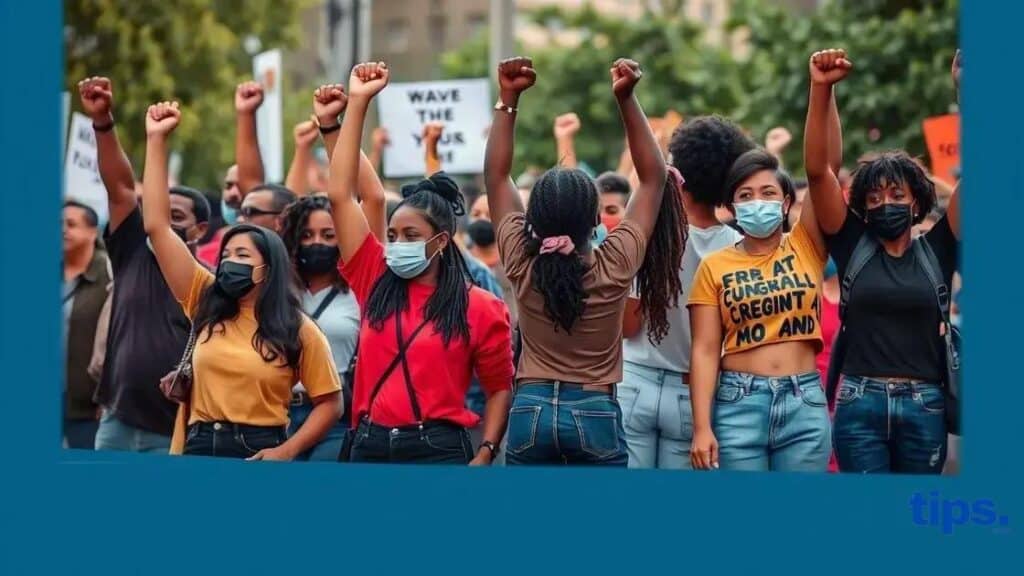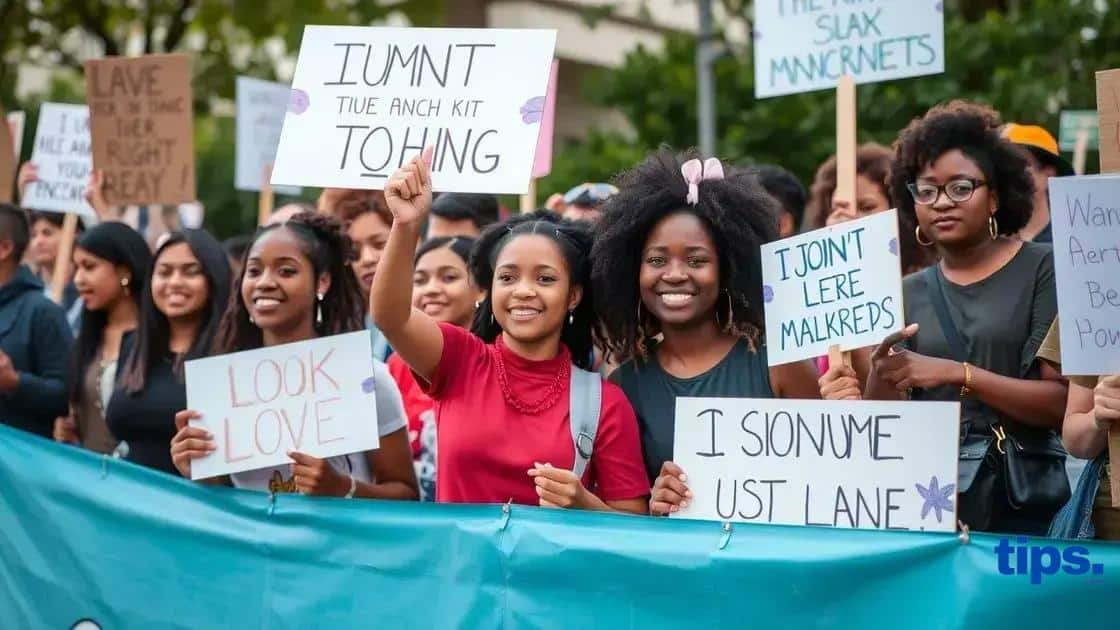Civil rights movements: understanding their impact today

Anúncios
Civil rights movements have significantly advanced equality and justice through notable legislation and activism, facing numerous challenges while also adapting to emerging trends like digital activism and youth engagement.
Civil rights movements have played a pivotal role in shaping our world and advancing social change. But how do they continue to influence the fight for equality today? Let’s explore this vital topic together.
Anúncios
Historical overview of civil rights movements
The historical overview of civil rights movements reveals a profound struggle for equality throughout history. These movements, rooted in the fight against oppression, have shaped our society in significant ways.
From the abolition of slavery to the Women’s Suffrage Movement, each era has played a crucial role in advancing the rights of marginalized groups.
Key Civil Rights Movements
Several important movements have influenced change:
Anúncios
- The Civil Rights Movement (1950s-1960s) focused on ending segregation and discrimination against African Americans.
- The LGBTQ+ rights movement has fought for equal rights and recognition for sexual and gender minorities.
- The Women’s Rights Movement advocated for gender equality and the right to vote.
Resources for learning more can be found at History.com, where you can explore detailed accounts of these movements.
| Topic | Action | Details |
|---|---|---|
| Historical Roots | Trace key movements | Slavery, suffrage, civil rights era |
| Notable Leaders | Learn from past icons | MLK Jr., Rosa Parks, Malcolm X |
| Key Events | Highlight turning points | March on Washington, Civil Rights Act |
| Youth Engagement | Empower young voices | Sit-ins, organizing, digital activism |
| Modern Movements | Explore current activism | BLM, Me Too, Climate Justice |
| Legislative Impact | Review civil rights laws | CRA 1964, VRA 1965, FHA 1968 |
| Movement Challenges | Understand obstacles | Violence, legal hurdles, division |
| Future Outlook | Adapt and innovate | Digital tools, intersectionality, youth |
Key figures in the civil rights movements
Throughout history, key figures in the civil rights movements have emerged as powerful voices for change. Their efforts have significantly advanced the cause of equality.
Leaders such as Martin Luther King Jr., Rosa Parks, and Malcolm X played critical roles during the Civil Rights Movement in the 1960s.
Influential Leaders
Each of these leaders brought unique strategies and perspectives:
- Martin Luther King Jr. advocated for nonviolent protest and civil disobedience.
- Rosa Parks is remembered for her pivotal role in the Montgomery Bus Boycott.
- Malcolm X emphasized black empowerment and was a prominent voice for African American rights.
For further insight into their contributions, visit Biography.com, which provides in-depth profiles of these remarkable leaders.
Major events and milestones
Throughout the history of civil rights movements, several major events and milestones have shaped the path toward equality. These events are crucial as they highlight the struggles and achievements of advocates for justice.
For instance, the March on Washington in 1963 was a defining moment, where Martin Luther King Jr. delivered his famous “I Have a Dream” speech.
Significant Milestones
Here are some key events that marked progress:
- The Brown v. Board of Education ruling in 1954 declared segregation in public schools unconstitutional.
- The passage of the Civil Rights Act of 1964 outlawed discrimination based on race, color, religion, sex, or national origin.
- The Voting Rights Act of 1965 aimed to eliminate barriers preventing African Americans from voting.
To explore more about these pivotal events, visit NAACP, an organization dedicated to fighting for civil rights.
The role of youth in civil rights activism

Youth have played a vital role in civil rights activism throughout history. Their energy and passion have driven many movements forward, sparking change and inspiring others.
During the Civil Rights Movement of the 1960s, young people joined protests, organized sit-ins, and advocated for justice.
Impact of Young Activists
Here are some ways youth contributed to civil rights:
- Leadership Skills: Young activists often took leadership positions, organizing events and creating strategies.
- Grassroots Movements: They helped establish grassroots organizations that focused on local issues affecting their communities.
- Innovative Approaches: Youth brought fresh ideas and methods, using technology and social media to amplify their messages.
To learn more about the impact of youth in civil rights, visit Youth.gov, which offers resources on youth engagement in social movements.
Modern movements inspired by civil rights
Modern movements inspired by civil rights have continued the fight for equality, justice, and social change. These movements draw lessons from the past while addressing current issues.
Examples such as Black Lives Matter and LGBTQ+ rights activism showcase the ongoing struggle for rights and inclusion.
Influence of Historical Movements
Today’s movements are shaped by historical events:
- Black Lives Matter: This movement focuses on combating systemic racism and violence against Black individuals.
- Me Too Movement: Inspired by earlier feminists, it addresses sexual harassment and assault, advocating for the rights of survivors.
- Climate Justice Movements: These movements align social justice with environmental issues, emphasizing the need for equitable solutions to climate change.
For further insights on contemporary movements, explore resources at Human Rights Campaign, which advocates for LGBTQ+ equality and social justice.
Analyzing the impact of legislation
Analyzing the impact of legislation on civil rights reveals how laws have shaped the landscape of equality and justice in society. Key laws have been enacted to address discrimination and promote fair treatment for all.
For example, landmark legislation such as the Civil Rights Act of 1964 and the Voting Rights Act of 1965 have made significant changes.
Key Legislative Changes
Several important laws have influenced civil rights:
- Civil Rights Act of 1964: This act prohibited discrimination based on race, color, religion, sex, or national origin.
- Voting Rights Act of 1965: This law aimed to eliminate barriers to voting for African Americans and protect voting rights.
- Fair Housing Act of 1968: This act prevented discrimination in housing based on race, color, religion, or national origin.
For more detailed information about significant legislation, visit National Archives, which provides historical context and analysis.
Challenges faced during civil rights struggles
The civil rights struggles have faced many challenges over the years. These obstacles have tested the resolve of activists and the movements they led.
From systemic opposition to violence, each challenge has impacted the progress toward equality.
Key Challenges
Here are some significant challenges faced during civil rights movements:
- Violence and Intimidation: Activists often faced threats and violent reprisals from opponents of civil rights.
- Legal Barriers: Laws and regulations sometimes created obstacles to equality, hindering progress.
- Internal Divisions: Different strategies and ideologies within movements sometimes led to fragmentation and conflict.
To learn more about the difficulties civil rights activists faced, visit ACLU, which advocates for civil liberties and rights.
The future of civil rights activism

The future of civil rights activism is shaped by emerging issues and evolving strategies. As society continues to change, new challenges require innovative approaches.
Activists must adapt to technological advancements and shifting social dynamics to effectively advocate for justice.
Emerging Trends
Here are some trends that may influence the future of civil rights:
- Digital Activism: The use of social media and online platforms will continue to grow, allowing activists to reach a wider audience.
- Intersectionality: Future movements will likely focus on the interconnectedness of various social issues, addressing multiple layers of discrimination.
- Youth Engagement: Young people will play a critical role in driving change, using their voices to highlight pressing issues.
For more information on civil rights activism, visit Southern Poverty Law Center, which works to fight hate and promote tolerance.
In summary, the impact of civil rights movements continues to shape our society
From historical struggles to modern activism, the fight for equality remains crucial. Many have faced significant challenges, but their efforts have led to important legal changes and social progress.
As we look to the future, the role of youth, digital activism, and intersectionality will likely drive the next phase of civil rights work. It’s vital for everyone to engage and support these movements to ensure a fair and just world.
By understanding and participating in civil rights activism, we all play a part in creating a society that respects and values every individual.





